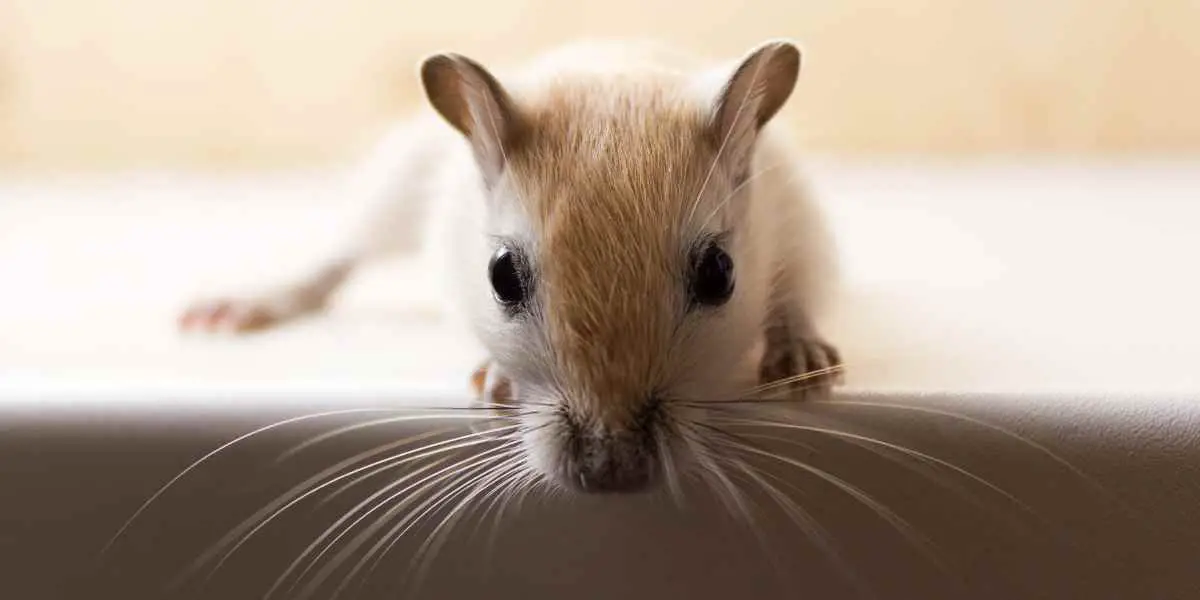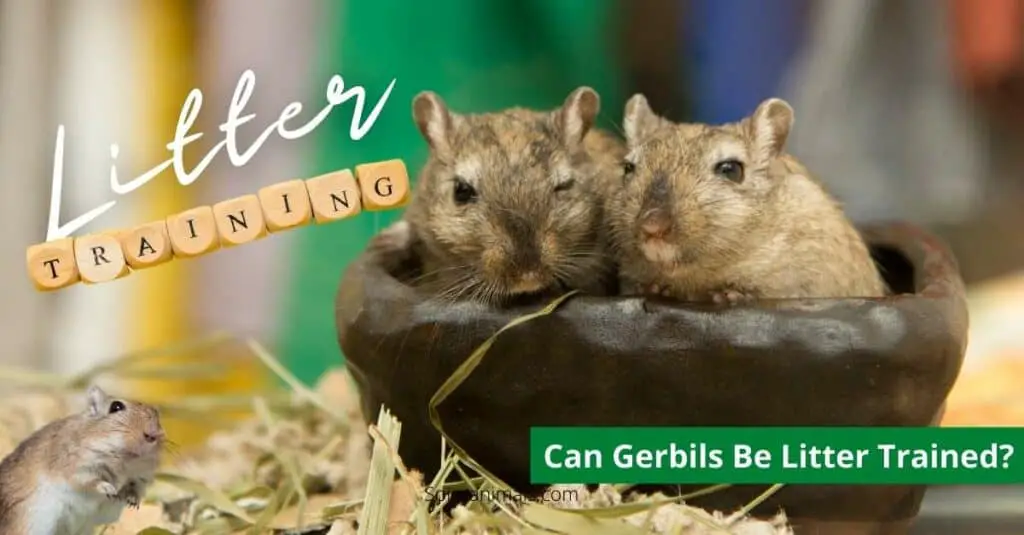Ever wondered, “Do Gerbils Need Baths?” The quick scoop: they ditch the water for a sandy spa day! Dive in to discover why your furry friend is flipping for sand, not splashes, and how it keeps them squeaky clean.
Table of Contents
Key Takeaways:
- Gerbils do not need water baths and should not be exposed to water directly.
- Providing a sand bath for gerbils is essential for their grooming needs.
- Sand baths should be offered at least once a week to keep gerbils clean.
- Chinchilla sand is a suitable option for gerbil sand baths.
- Avoid using chinchilla dust or water baths as they can be harmful to gerbils’ health.

Understanding Gerbil Grooming Habits
Gerbils, delightful creatures as they are, naturally have their own distinct grooming habits. Many gerbil owners marvel at how gerbils spend a large chunk of their time grooming themselves, which not only helps them regulate their body temperature but also keeps their fur pristine and enhances their overall hygiene. A deep understanding of these grooming habits is indispensable for gerbil owners looking to provide the best care.
One pronounced grooming behavior is the gerbils’ adeptness at self-cleaning. They employ their teeth to comb out dirt, debris, and the occasional excess oil. Using their nimble paws, they ensure their fur remains clean and free of tangles. This intrinsic behavior is essential for their well-being.
Now, how do you help your gerbil with its grooming ritual? Many gerbil owners swear by sand baths. Instead of giving a gerbil a water bath, which can be detrimental, offer them a sand bath. Sand baths act as a natural and safe mechanism for gerbils to maintain cleanliness. Chinchilla sand is especially recommended since its fine grains adeptly absorb excess oils. To set this up, sprinkle about an inch of sand into a shallow dish or bowl in their habitat. Watch as your gerbil takes to sand baths, rolling around joyfully.
It’s vital to mention that you shouldn’t pour sand over your gerbil or try to bathe a gerbil with water. Such actions can induce stress. Instead, let your gerbil explore the sand bath at its own pace. Ideally, you’d want to leave the bath in the cage so your gerbil can roll in the sand whenever it pleases. Regular interactions with clean sand baths, preferably once a week, prevent bacterial build-up. While many gerbil owners prefer using chinchilla sand, it’s crucial to buy sand and not dust, as chinchilla dust or water baths can pose respiratory challenges and undue stress.
Gerbil Grooming Tips:
- Offer a sand bath once a week, or keep the sand bath permanently in the cage.
- Employ chinchilla sand to ensure optimal cleanliness.
- Make sure the bowl is filled with sand and let your gerbil burrow and roll.
- Avoid pouring sand on top of your gerbil or giving your gerbil a water bath.
- Always use sand to clean, and ensure it’s the right kind of sand.
- Keep an eye out; if gerbils don’t seem to take to sand baths immediately, give them time.
- Sterilize the sand periodically for a fresh, clean sand bath experience.
In wrapping up, while gerbils don’t require traditional water baths, a sand bath is non-negotiable for their grooming regimen. Recognizing their inherent grooming habits and furnishing an appropriate sand bath ensures your gerbil remains in tip-top shape. For every gerbil owner, remember to heed these grooming tips to guarantee their health and avert potential respiratory issues or stressors.
The Importance of Sand Baths for Gerbils
Sand baths are paramount in ensuring gerbil cleanliness and overall well-being. Unlike other critters, gerbils don’t need water baths; in fact, giving your gerbil a water bath will cause potential harm to their delicate skin. Instead, when you need to clean your gerbil, it’s best to let your gerbil take a sand bath. This natural grooming method keeps their fur and skin pristine.
By nature, gerbils have an instinct to roll around in the sand, effectively removing dirt, excess oils, and dead skin. This self-grooming, or as some might call it, bathing in the sand, is vital. It not only keeps their coat soft but also regulates body temperature. So, how often should you give your gerbil a bath in the sand? At least once a week ensures they maintain top-notch hygiene, staving off potential health issues.
Now, if you’re looking to spot-clean your gerbil or ensure they take a proper bath, you need to buy the right sand. Chinchilla sand is your go-to choice. This dust-free, finely textured sand ensures your gerbil can get all the benefits of a bath without respiratory risks. When setting up, pour the fresh sand into a bowl within the gerbil’s enclosure. This makes it easy for the gerbil to roll around, dive in, and even burrow.
It’s crucial to remember, though, your gerbil doesn’t need to be covered in sand during their bath time. Your gerbil will naturally ensure they’re well-groomed in the sand. Always provide fresh sand baths regularly to keep your gerbils clean and prevent bacterial threats. It’s best to avoid dust baths or sand baths made of chinchilla dust and, of course, water baths, which could stress your furry companions.
Gerbil Bathing Tips:
- Use a shallow dish filled with chinchilla sand for your gerbil’s bath.
- Position the sand bath in an area your gerbil can easily access.
- Aim to offer a sand bath at least once a week.
- Your gerbil will instinctively know how to bathe; there’s no need to pour sand on them.
- Abstain from using chinchilla dust or water; these aren’t gerbil-friendly.
- Always keep an eye on your gerbil during their bath, ensuring their utmost safety.
Gerbils also benefit from the therapeutic act of rolling in the sand. So, if you ever think your gerbil might need a bath, remember it’s the sand they crave, not the water!
Choosing the Right Sand for Gerbil Baths
Gerbils, unlike humans, don’t need water to take a bath. Instead, they utilize a unique method called a sand bath or sometimes referred to as a dust bath. But not all sands are equal when it comes to pampering your gerbil. Selecting the right sand for gerbil baths is vital to ensure their well-being.
- When it comes to providing a suitable sand bath for your gerbil, it’s essential to choose a sand type that’s safe and appropriate for their delicate skin and health.
- Chinchilla sand is a top choice for gerbil baths due to its fine texture and natural absorbent properties. These sand particles are gentle on the gerbil’s skin, helping to remove dirt and excess oils. It’s imperative to make sure to buy sand specifically meant for bathing. Using other types, like regular play sand or sharp-edged sand, can risk your gerbils’ health by causing skin irritations and injuries.
- For those wondering about the frequency, it’s good to give your gerbil a regular opportunity to enjoy their sand bath. It’s not a permanent sand bath setup, but rather a few minutes so your gerbil can roll and enjoy. Gerbils roll in the sand, mimicking their natural behavior in the wild, where they would use dust baths.
- When introducing sand into the bowl, ensure it’s deep enough for the gerbil to burrow but not so deep that they disappear completely. This allows your gerbil to immerse itself fully and get the most out of its bathing experience.
- Monitor the sand’s condition. Replace it when it becomes soiled or wet. A clean and dry sand bath reduces the risk of bacterial infections and ensures a hygienic environment.
- Never give your gerbil a water bath. Their natural grooming method, combined with the right sand, will keep them clean and happy.
Setting Up a Sand Bath Area for Your Gerbil
Creating a suitable sand bath area is key to promoting regular gerbil grooming. Gerbils naturally enjoy rolling around in sand to clean themselves, so providing an appropriate space for this activity is essential for their overall hygiene. Here are some tips on setting up a sand bath area for your gerbil:
- Choose a shallow dish or bowl: Select a container that is easy for your gerbil to access and move around in. A ceramic or glass dish works well, as it is heavy enough to prevent tipping. Avoid using plastic, as gerbils may chew on it.
- Select the right sand: Use chinchilla sand specifically designed for small animals like gerbils. It is important to avoid chinchilla dust, as it can be harmful if inhaled. The sand should be dust-free and fine in texture, allowing your gerbil to roll and burrow comfortably.
- Place the sand bath in the enclosure: Position the sand bath in an easily accessible area of your gerbil’s enclosure. Make sure it is away from their food and water sources to prevent contamination. Ensure the sand is at least an inch deep to allow for proper burrowing and rolling.
By providing a dedicated sand bath area for your gerbil, you are giving them the opportunity to groom themselves effectively and maintain their cleanliness. Regular access to a sand bath will help remove dirt and excess oils from their fur and skin, preventing bacterial infections and keeping them healthy and happy. Remember to clean and replace the sand regularly to maintain its cleanliness and effectiveness.
| Tip | Benefit |
|---|---|
| Keep the sand dry | Damp or wet sand can clump and become uncomfortable for gerbils. Ensure the sand bath remains dry for optimal grooming. |
| Provide supervision | While gerbils generally groom themselves safely, it is important to keep an eye on them during their sand bath time to ensure they do not accidentally ingest large amounts of sand. |
Encouraging Gerbils to Use Their Sand Baths
While gerbils are naturally inclined to groom themselves, there are ways to encourage them to use their sand baths more frequently. Providing a dedicated area for their sand bath is essential for their hygiene and well-being. Here are some gerbil grooming tips to help you encourage your furry friends to utilize their sand baths:
- Introduce the sand bath early: When you first bring home your gerbil, make sure to set up the sand bath area in their enclosure right away. This way, they will become familiar with it from the beginning and recognize it as part of their grooming routine.
- Make it accessible: Ensure that the sand bath area is easily accessible for your gerbil. Place it in a corner of their enclosure where they frequently spend their time. This will encourage them to naturally gravitate toward the sand bath when they feel the need to groom themselves.
- Keep it clean: Regularly clean and replace the sand in your gerbil’s bath area. Gerbils prefer clean sand, and keeping it fresh will entice them to use it more often. Remove any soiled or damp sand to maintain optimal cleanliness.
“The sand bath should be a comfortable and inviting space for your gerbil.”
Remember, gerbils are naturally clean animals, and they will instinctively groom themselves in their sand baths. By following these gerbil grooming tips, you can ensure that they have a pleasant and enticing experience. Keep in mind that each gerbil is unique and may have their preferences when it comes to sand baths, so observe their behavior and adjust accordingly to provide them with the best possible grooming environment.
| Gerbil Grooming Tips | Frequency |
|---|---|
| Introduce the sand bath early | Immediately upon bringing your gerbil home |
| Make it accessible | Place it in a corner of their enclosure where they spend their time |
| Keep it clean | Regularly clean and replace the sand |
In conclusion, while gerbils do not need water baths, they do require access to sand baths for their grooming needs. By setting up a comfortable and inviting sand bath area and following the appropriate gerbil grooming tips, you can encourage your gerbil to use their sand bath more frequently. This will help them maintain their cleanliness, remove dirt and excess oils from their fur and skin, and prevent bacterial infections. Remember to avoid using chinchilla dust or water baths, as these can be harmful to your gerbil’s health. With proper care and attention, your gerbil will enjoy a happy and hygienic life.
The Dangers of Water Baths and Chinchilla Dust
Contrary to popular belief, gerbils do not require water baths or chinchilla dust for their cleanliness. In fact, these practices can be harmful to their delicate skin and overall health. Water baths can cause stress and discomfort for gerbils, as they are not naturally accustomed to being submerged in water.
Chinchilla dust, often recommended for other small animals, can also pose risks to gerbils. This fine dust can irritate their respiratory system, leading to respiratory problems and distress. It is important to prioritize the well-being of your gerbil by avoiding these potentially harmful practices.
Instead, the best way to maintain your gerbil’s cleanliness is by providing them with a sand bath. Gerbils naturally groom themselves by rolling around in the sand, which helps to remove dirt and excess oils from their fur and skin. Chinchilla sand is a suitable option that can be placed in a shallow dish or bowl in your gerbil’s enclosure.
| Sand Bath Guidelines | |
|---|---|
| Frequency | At least once a week |
| Method | Place chinchilla sand in a shallow dish or bowl |
| Grooming Process | Gerbils will naturally groom themselves in the sand, no need to pour sand over them |
| Benefits | Keeps gerbils clean and prevents bacterial infections |
By providing regular sand baths for your gerbil, you can ensure their cleanliness and promote good hygiene without risking their health. Remember to clean and replace the sand as needed to maintain a sanitary environment for your furry friend. Keeping your gerbil’s well-being in mind will help them live a happy and healthy life.
Preventing Bacterial Infections through Regular Sand Baths
Regular sand baths are vital for maintaining gerbil hygiene and preventing bacterial infections. Gerbils have a natural instinct to groom themselves by rolling around in the sand, which helps to remove dirt and excess oils from their fur and skin. Providing them with a sand bath at least once a week not only keeps them clean, but also stimulates their natural grooming behavior.
When choosing sand for your gerbil’s bath, opt for chinchilla sand as it is specially formulated for small animals and does not contain any harmful additives. It is important to note that chinchilla dust should be avoided, as it can cause respiratory problems and stress for gerbils. Instead, fill a shallow dish or bowl with chinchilla sand and place it in your gerbil’s enclosure.
Allowing your gerbil to naturally groom itself in the sand is sufficient; there is no need to pour sand over them. Gerbils will instinctively roll around in the sand, ensuring that it reaches all areas of their fur and skin. This regular cleaning routine helps to prevent the buildup of bacteria and keeps your gerbil healthy.
| Gerbil Grooming Tips: |
|---|
| Provide a sand bath at least once a week. |
| Use chinchilla sand for optimal results. |
| Place the sand in a shallow dish or bowl. |
| Allow your gerbil to naturally groom itself in the sand. |
| Avoid using chinchilla dust or water baths. |
By incorporating regular sand baths into your gerbil’s hygiene routine, you are ensuring that they stay clean and reducing the risk of bacterial infections. Remember to observe your gerbil’s behavior and adjust the frequency of sand baths if necessary, as individual gerbils may have different grooming needs. With the proper care and attention to gerbil hygiene, you can help your furry friend lead a healthy and happy life.
Additional Tips for Gerbil Cleanliness
In addition to sand baths, there are other ways to ensure your gerbil stays clean and healthy. Regular brushing is an essential part of gerbil grooming, especially for long-haired gerbil breeds. Using a soft-bristled brush or a grooming glove, gently brush your gerbil’s fur to remove any loose hairs or debris. This not only helps maintain their cleanliness but also reduces the risk of hairballs forming in their digestive system.
“Regular brushing is an essential part of gerbil grooming, especially for long-haired gerbil breeds.”
Another important aspect of gerbil cleanliness is keeping their living environment clean. Regularly clean their enclosure by removing any soiled bedding, uneaten food, and droppings. Wipe down the walls and surfaces with a pet-safe disinfectant to maintain a hygienic environment. Providing fresh water daily and ensuring food is kept fresh and free from contamination are also crucial for your gerbil’s overall cleanliness and health.
Table 1: Recommended Grooming Tools
| Grooming Tool | Description |
|---|---|
| Soft-Bristled Brush | A gentle brush suitable for all gerbil breeds. |
| Grooming Glove | An alternative to a brush, offering a hands-on approach to grooming. |
It’s important to monitor your gerbil’s overall health and cleanliness. Regularly check their ears, eyes, and paws for any signs of infection, injury, or excessive dirt. If you notice any abnormalities or concerns, consult a veterinarian who specializes in small animals. They can provide further guidance and ensure your gerbil receives appropriate care.
- Regular brushing helps maintain cleanliness and prevents hairballs.
- Keep the gerbil’s living environment clean by removing soiled bedding and disinfecting surfaces.
- Monitor your gerbil’s overall health and seek veterinary care if needed.
By implementing these additional tips alongside regular sand baths, you can ensure that your gerbil remains clean, healthy, and happy!
Conclusion
In conclusion, while gerbils do not need traditional baths, providing them with regular sand baths is essential for their hygiene and overall well-being. Gerbils have natural grooming habits that involve cleaning themselves by rolling around in sand. This process helps remove dirt and excess oils from their fur and skin, keeping them clean and healthy.
To create a suitable sand bath for your gerbil, choose chinchilla sand, as it is safe and specifically designed for these small rodents. Place the sand in a shallow dish or bowl within your gerbil’s enclosure. The gerbil will naturally groom itself in the sand, so there is no need to pour sand over them.
It is important to provide sand baths on a regular basis, ideally at least once a week. This routine will help maintain your gerbil’s cleanliness and prevent the development of bacterial infections. Remember to avoid using chinchilla dust or water baths, as these can cause respiratory problems and stress for your gerbil.
By following these guidelines and incorporating regular sand baths into your gerbil’s grooming routine, you can ensure their hygiene and well-being. Your gerbil will appreciate the chance to keep itself clean and healthy through its natural grooming habits in the comfort of its own enclosure.
FAQ
Q: Do Gerbils Need Baths?
A: Yes, gerbils do need baths. However, they don’t require traditional water baths like other pets. Instead, gerbils need sand baths to keep themselves clean and healthy.
Q: What is a gerbil sand bath?
A: A gerbil sand bath is a method of cleaning that involves providing your gerbil with a container filled with a special type of dust-like sand. Gerbils will roll around in the sand, which helps remove excess oils and keeps their fur in good condition.
Q: Why do gerbils need sand baths?
A: Gerbils need sand baths because they naturally have oily fur. These sand baths help absorb the oils and remove dirt from their fur, keeping them clean and preventing any skin issues.
Q: How often should I give my gerbil a sand bath?
A: It is recommended to provide your gerbil with a sand bath at least once a week. However, if your gerbil seems particularly dirty or has a lot of oily fur, you can offer them a sand bath more frequently.
Q: Can I use regular sand for a gerbil sand bath?
A: No, it is essential to use special dust-like sand specifically designed for gerbil sand baths. Regular sand can be too coarse for their delicate fur and may cause irritation or other skin problems.
Q: Where can I find gerbil sand?
A: Gerbil sand is readily available at most pet stores. Look for a brand that specifically states it is safe for gerbils and suitable for use in sand baths.
Q: How do I give my gerbil a sand bath?
A: To give your gerbil a sand bath, fill a small container, such as a shallow dish or a small box, with the special sand. Place the container in your gerbil’s cage and let them explore and roll around in it. Be sure to supervise to ensure they don’t spill or scatter the sand everywhere.
Q: My gerbil doesn’t seem interested in the sand bath. What should I do?
A: Some gerbils may not immediately take to the sand bath. Give them time to get used to it and try to make it more enticing by adding a treat or placing a favorite toy nearby. If your gerbil still doesn’t show interest, consult with a veterinarian for further advice.
Q: Can gerbils take water baths like other pets?
A: No, gerbils should not be given traditional water baths as it can cause stress and potentially lead to health problems. Gerbils are desert animals and are not adapted to being soaked in water.
Q: How do gerbils keep themselves clean without water baths?
A: Gerbils are naturally clean animals and groom themselves regularly. In addition to their sand baths, they use their paws and tongues to keep their fur clean and tidy.




